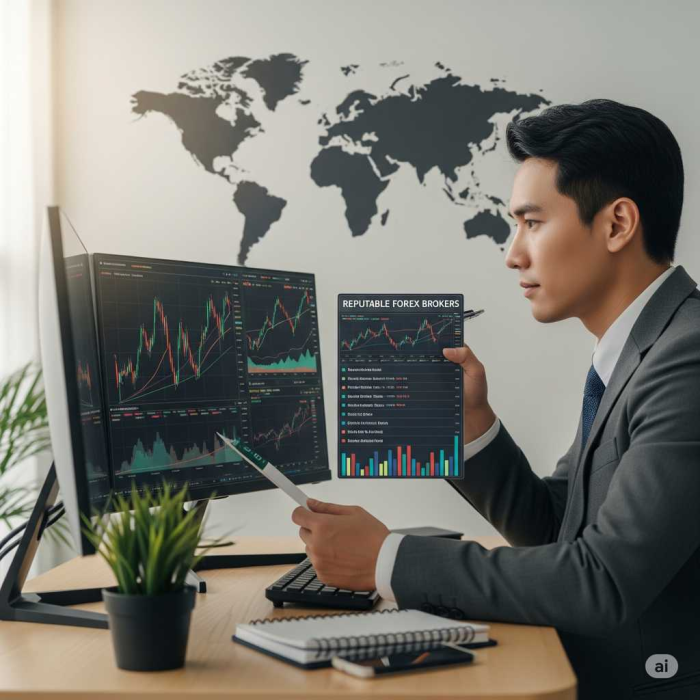Choosing Your Forex Broker| A Crucial Step for Trading Success
So, you've delved into the exciting world of Forex trading. You've studied charts, understood pips, and perhaps even demo-traded your way to some hypothetical profits. Now comes a critical juncture: choosing the right Forex broker. This isn't a decision to be taken lightly; your broker is your gateway to the market, and their reliability, features, and pricing can significantly impact your trading experience and profitability.
With a plethora of brokers vying for your attention, how do you navigate the options? Here's a comprehensive guide to help you make an informed decision:

1. Regulation and Security: Your Paramount Concern
This is non-negotiable. Before you even look at spreads or platforms, ensure the broker is regulated by a reputable financial authority. Different countries have their own regulatory bodies, such as:
- FCA (Financial Conduct Authority) - UK
- CySEC (Cyprus Securities and Exchange Commission) - Cyprus
- ASIC (Australian Securities and Investments Commission) - Australia
- CFTC (Commodity Futures Trading Commission) and NFA (National Futures Association) - USA
Regulation provides a layer of protection for your funds, ensuring the broker adheres to strict financial standards, operates transparently, and has mechanisms in place for dispute resolution. Avoid unregulated brokers at all costs, no matter how attractive their offers seem – your capital is at immense risk.
2. Trading Platforms: Where You Execute Your Strategy
The trading platform is your primary interface with the market. Look for a platform that is:
- User-friendly: Easy to navigate, even for beginners.
- Feature-rich: Offers a wide range of analytical tools, indicators, and charting options.
- Stable and reliable: Minimizes slippage and downtime, especially during volatile market conditions.
- Accessible: Available on desktop, web, and mobile devices.
The most popular platforms are MetaTrader 4 (MT4) and MetaTrader 5 (MT5), known for their robustness and extensive customization options. Some brokers also offer their proprietary platforms, which might be worth considering if they provide unique features or a particularly intuitive interface.
3. Spreads and Commissions: Understanding Your Costs
This is where the broker makes their money. Spreads are the difference between the bid and ask price of a currency pair, while commissions are a flat fee charged per trade.
- Variable vs. Fixed Spreads: Variable spreads fluctuate based on market volatility, while fixed spreads remain constant. Variable spreads are generally lower during calm market conditions but can widen significantly during news events.
- ECN/STP vs. Market Maker: ECN (Electronic Communication Network) and STP (Straight Through Processing) brokers typically offer tighter spreads with a commission, as they route your orders directly to liquidity providers. Market Maker brokers, on the other hand, often have wider spreads with no commission, as they act as the counterparty to your trades. Understand the difference and choose what aligns with your trading style.
- Hidden Fees: Always read the fine print! Be aware of potential inactivity fees, withdrawal fees, or other charges that could eat into your profits.
4. Customer Support: Your Lifeline When You Need It
When you're dealing with live funds and fast-moving markets, reliable customer support is crucial. Look for a broker that offers:
- Multiple contact channels: Live chat, phone, email.
- 24/5 availability: Forex markets operate round-the-clock during the week.
- Responsive and knowledgeable staff: They should be able to answer your questions and resolve issues promptly.
- Multilingual support: Especially important if English isn't your first language.
5. Deposit and Withdrawal Options: Convenience and Efficiency
Check the variety and efficiency of their deposit and withdrawal methods.
- Funding Options: Bank wire transfers, credit/debit cards, e-wallets (Skrill, Neteller, PayPal).
- Processing Times: How long do deposits take to reflect in your account, and how quickly are withdrawals processed?
- Fees: Are there any charges for depositing or withdrawing funds?
6. Educational Resources and Research Tools: For Continuous Learning
A good broker will often provide resources to help you improve your trading skills.
- Educational materials: Webinars, tutorials, e-books, articles.
- Market analysis: Daily news, economic calendars, technical analysis reports.
- Demo account: Essential for practicing your strategies without risking real money.
7. Account Types and Leverage: Tailoring to Your Needs
Brokers typically offer various account types (e.g., standard, mini, micro, VIP) with different minimum deposits, leverage options, and features.
- Leverage: Understand how leverage works and the risks involved. While it can magnify profits, it can also amplify losses. Choose a leverage level you are comfortable with and that aligns with your risk tolerance.
- Minimum Deposit: Start with an amount you can afford to lose, especially if you're new to live trading.
The Bottom Line
Choosing a Forex broker is a highly personal decision. Take your time, do your research, and don't be swayed by flashy promotions. Prioritize safety and reliability, then consider features that align with your trading style and goals. Opening a demo account with a few shortlisted brokers can be an excellent way to test their platforms and services before committing your capital.
By carefully considering these factors, you'll be well on your way to selecting a Forex broker that empowers your trading journey and sets you up for long-term success. Happy trading!
Popular Tags